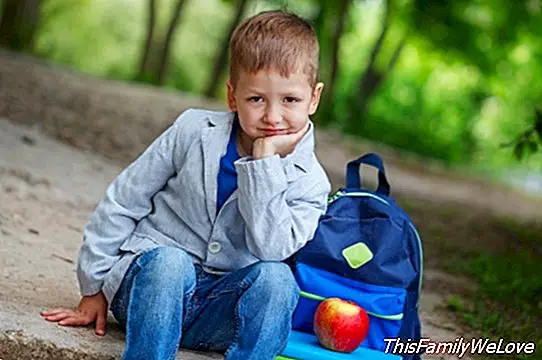Back to school: the 3 most common reactions of children and how to act

In Early Childhood Education, the first days of the "back to school"They are especially sensitive for both children and families, schools know this and focus their efforts on the reception of children, as this incorporation leaves a deep impression on their feeling of security.
During these first days of attendance at the center, the boy or girl will undergo a series of changes, since he goes from being in a medium in which he is the main protagonist, to another in which he is going to have to live together, relate and share with your peers. In addition, it has to be incorporated into a new environment where people, spaces and materials are unknown to him and he has to separate himself from loved and known people.
These are the 3 reactions of children in the return to school
Given their new incorporation into school life, children often react in different ways:
- Some rebel in the first moment of the return to school and release their contained anger, in the form of crying, kicking or even throwing objects and not wanting to do anything that is asked. Some even refuse food or begin to pee again. In principle it is a normal reaction and the adaptation forecast is good.
- Others wear it well between quotation marks the first day, but it is in the second or third (to see that the situation is not transient) when they take rebellion with anger or sadness. This case is also usual and also augurs a correct adaptation and not too long.
- Another group of children seem to accept the situation, but they manifest attitudes of isolation. They do not cry, they do what they are told, they collaborate if asked, but with a sad and resigned face. They usually stay in a corner watching passively and speak very little. These are the ones that worry educators the most because they have a hard time getting their feelings and emotional state out, and they need more time to adapt.
The period of adaptation can be terminated when a certain emotional stability has been achieved in the group, and the children are able to assume with more tranquility the moments of separation and reunion with the families, as well as the totality of the time of stay in the group. center.
Educators' tips for adapting to school
Although the period of adaptation has particular characteristics that depend on several factors such as the child's age or previous attendance at a school, the World Association of Early Childhood Educators (AMEI-WAECE) offers some advice to parents:
1. Keep calm and show tranquility and security. Depending on the attitude of the parents, the child can live his first day of school as an adventure or as a bad experience. If the mother or father live with difficulty this moment, the child will complain anxiously and will live the adaptation with insecurity and fear.
2. The relationship of trust between the center and the family is very important. The objective is to achieve mutual knowledge among the parties involved (parents-children-school), in which a relationship of trust is established.
3. Be very alert, since each child externalizes and expresses the emotions of these days in different ways, but all of them need help from their parents and educators.
4. Respect the adaptation. The educational center should inform families of the importance of respecting the adaptation period, and it is advisable to provide an informative document on how it should be carried out so that it serves as a reference for both parties. During the first meeting with the tutor or classroom tutor, times will be established with the parents until the total permanence of the child in the center, attending to the individuality of the same, to the needs of the family and their personal circumstances.
5. Presence of families. In the period of adaptation it will depend on the age of the children, the characteristics of the group and the approaches of each center or educator. The center must consider this option as an offer, never as an imposition, since it is necessary to contemplate family situations in which parents can not go with their children because they do not allow it at work. In this case, parents should not be made to feel guilty, but help as much as possible so that the adjustment period is as little traumatic as possible for the child.
6. Routines. Although what is sought during the adaptation period is that the child is incorporated into the new routines, in the first days you have to be flexible and above all patient, since the children must adapt to the new schedules.
"In these moments, parents are influenced by how they themselves live the separation: their fears, their expectations, their anxiety, their anguish, their security or insecurity, their degree of confidence in the institution and the possibilities of their child. a, etc.All this is transmitted and captured by the child, "says Juan Sánchez Muliterno, president of the World Association of Early Childhood Educators (AMEI-WAECE)." If the mother lives with difficulty this time the child will complain anxiously and will live the adaptation with insecurity and fears. The most important thing is to stay calm and show security. "
Marisol Nuevo Espín
Advice:Juan Sánchez Muliterno, president of the World Association of Early Childhood Educators (AMEI-WAECE).




